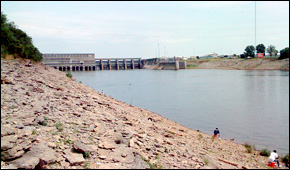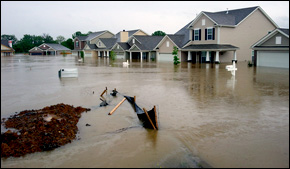Army Corps Defends Dam Operations in Tennessee
Sen. Lamar Alexander, R-Tenn., has called for a hearing on flood releases from a dam upstream from Nashville, while the city attempts to clean up.

Water releases at a dam upstream from Nashville during record flooding two weeks ago have prompted a United States Senate inquiry into whether the public was properly warned about the rising waters, the AP reports.
Record rainfall at the start of May unloaded 13 inches onto the Nashville area, forcing the U.S. Army Corps of Engineers to open spillways at Old Hickory Dam to prevent an additional four feet of water from inundating the city and damaging the dam.
The dams around Nashville are used primarily for river navigation and have a limited capacity to hold flood swells, Bob Sneed, chief of water management for the Nashville District told the AP.
The Army Corps, which operates the dam, was opening flood gates wider every 15 minutes on May 2 to keep water levels at the dam under control. In the afternoon water was being discharged at a peak rate of 212,260 cubic feet per second–nearly 10 times the average discharge for May.
Water levels at Old Hickory crested just a foot below the top of the dam, Sneed told the AP.
While the Corps feels its actions are justified, many in Nashville are wishing information about river levels and weather forecasts was better shared between local, state and federal agencies.
“I don’t think we got information from anybody that was definitive enough for our desire,” said Nashville mayor Karl Dean, the Tennessean reported.
“Without assigning blame, I’m just saying that when you’re in an emergency situation and you’re trying to make decisions and you’re looking at things, that is frustrating,” he added.

Dean was concerned about the quality of information from the National Weather Service. The agency changed its predictions regarding when the Cumberland River would crest several times, the Tennessean reports.
But weather experts say that such changes are necessary responses to changes in weather patterns.
“The river forecasts were under constant revision as the precipitation estimates became precipitation measurements,” said meteorologist Mark Rose to the Tennessean.
While officials wrangle over how to respond better during the next flood, one of Tennessee’s national representatives is making sure the state has enough money to recover from this one.
Sen. Lamar Alexander, R-Tenn., announced that the Senate Appropriations Committee, of which he is a member, had approved emergency funds for Tennessee as part of a $5.1 billion increase in funding for the Federal Emergency Management Administration, according to a press release from his office.
Among the committee’s recommendations for immediate assistance to Tennessee are:
- An increase in the share of federal costs for FEMA-funded projects from 75 percent to 90 percent
- $49 million for economic assistance
- $100 million for Community Development Block Grants to be used to help businesses repair and reopen
- $72 million to repair flood damage at the Naval Support Activity Mid-South in Millington, Tenn., which is where all Navy personnel records are managed and also serves as Navy headquarters for recruitment activities
Meanwhile, Nashville is beginning to clean up. Restoration work is being done on objects damaged in flood waters that covered the floor of the iconic Grand Ole Opry House in nearly four feet of water.
It is too early to assess costs, said Grand Ole Opry Group president Steve Buchanan to the Tennessean, because the hotel is still in the process of determining what to salvage and what to throw away.
City residents are being asked to conserve water until the end of May when one of the city’s damaged treatment plants becomes fully operational again.
Sources: AP, Tennessean
Brett writes about agriculture, energy, infrastructure, and the politics and economics of water in the United States. He also writes the Federal Water Tap, Circle of Blue’s weekly digest of U.S. government water news. He is the winner of two Society of Environmental Journalists reporting awards, one of the top honors in American environmental journalism: first place for explanatory reporting for a series on septic system pollution in the United States(2016) and third place for beat reporting in a small market (2014). He received the Sierra Club’s Distinguished Service Award in 2018. Brett lives in Seattle, where he hikes the mountains and bakes pies. Contact Brett Walton










Leave a Reply
Want to join the discussion?Feel free to contribute!